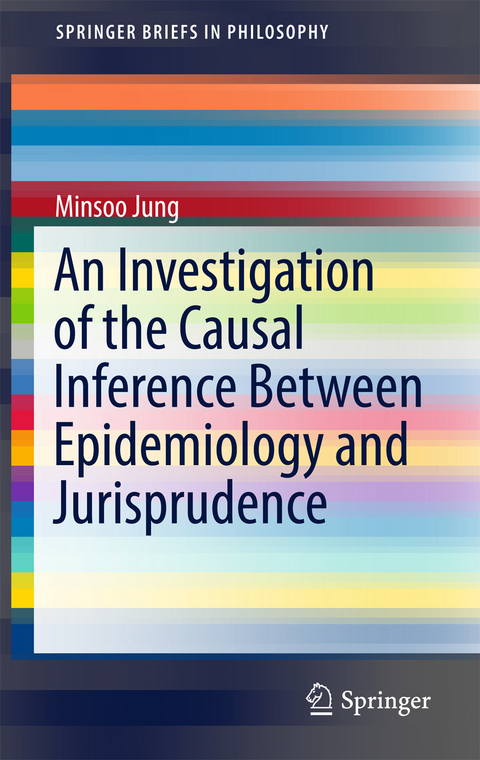
An Investigation of the Causal Inference between Epidemiology and Jurisprudence
Springer Verlag, Singapore
978-981-10-7861-3 (ISBN)
Minsoo Jung, is an Assistant Professor in the Department of Health Science at Dongduk Women’s University, Seoul, South Korea. He completed his Ph.D. and M.P.H. in the Graduate School of Public Health at Seoul National University. Jung also finished his second Ph.D. in the Law School at Seoul National University. He has a keen interest in social epidemiology, philosophy of law, and health communication. Before joining the university, he worked as a research fellow in the Center for Community-Based Research at the Dana-Farber Cancer Institute, Harvard School of Public Health. His professional research goal is to broaden the understanding of issues in social epidemiology. He has participated in 12 research projects as a principal investigator and presented several papers in professional meetings, including the American Public Health Association Annual Meeting. He has authored more than 50 peer-reviewed journal articles and has received 15 academic awards from governmental and academic institutions.
1. Introduction.- 2. Research Background.- 2.1. Essential Review of Causation.- 2.2. Causation in Philosophy.- 2.2.1. The Problem of Induction.- 2.2.2. Causation in Empirical Philosophy.- 2.2.3. Causation in the Philosophy of Law.- 2.3. Causation in Criminal Law.- 2.3.1. Theory of Objective Imputation and Criticisms.- 2.3.2. Comparison with the Anglo-American Theory of Causation.- 2.3.3. Application to the South Korean Criminal Act.- 2.3.4. Legal Cases in Korea.- 2.3.5. Remarks.- 2.4. Causation in Civil Law.- 2.4.1. Causation in Medical Malpractices.- 2.4.2. Objects of Proof and the Burden of Proof.- 2.4.3. Review of Judicial Precedents.- 2.4.4. Remarks.- 2.5. Causation in Epidemiology.- 3. Methods in Epidemiology.- 3.1. The Role of Epidemiology.- 3.2. Epidemiological Investigation.- 3.2.1. Experimental Study and Observational Study.- 3.2.2. Types of Observational Study.- 3.3. Interpretations of Epidemiological Results.- 3.3.1. Relative Risk.- 3.3.2. Odds Ratio.- 3.3.3. Attributable Risk.- 3.4. Causal Misinterpretations in Epidemiology.- 4. Debates on Causation in Tobacco Lawsuits.- 4.1. Legal Perspectives.- 4.2. Epidemiological Perspectives.- 4.3 Tobacco Lawsuit Cases in Korea.- 5. Criteria of Epidemiological Causation and its Limitations.- 5.1. Criteria of Epidemiological Causation.- 5.2. Critiques of the Epidemiological Criteria.- 5.3. Pragmatic Pluralism in Causal Inference.- 5.3.1. Potential Outcomes Approach.- 5.3.2. Restricted Potential Outcomes Approach.- 5.3.3. Difficult Points of Restricted Potential Outcomes Approach.- 5.4. Scientific Evidence in the Court.- 5.5. Remarks.- 6. Epidemiological Causation and Legal Causation.- 6.1. Legal Proof on Causation with Epidemiological Results.- 6.2. Legal Proof on Causation without Epidemiological Results.-6.3. Concluding Remarks.- 7. Conclusions.- 7.1. Concluding Remarks.- 7.2. Practical Implications.- Appendix.- References.
| Erscheinungsdatum | 04.03.2018 |
|---|---|
| Reihe/Serie | SpringerBriefs in Philosophy |
| Zusatzinfo | VIII, 108 p. |
| Verlagsort | Singapore |
| Sprache | englisch |
| Maße | 155 x 235 mm |
| Themenwelt | Geisteswissenschaften ► Philosophie |
| Studium ► Querschnittsbereiche ► Epidemiologie / Med. Biometrie | |
| Recht / Steuern ► Allgemeines / Lexika | |
| Recht / Steuern ► EU / Internationales Recht | |
| Sozialwissenschaften ► Politik / Verwaltung | |
| Schlagworte | Anglo-American Theory of Causation • Causal Inference between jurisprudence and epidemo • Causal Inference between jurisprudence and epidemology • Causation in criminal law • Causation in empirical philosophy • Causation in epidemiology • Causation in the philosophy of law • Epidemiological causation and legal causation • Epidemiological causation and limitations • Epidemiological evidence in lawsuits • Epidemiological investigation in South Korea • Health inequalities and the law in South Korea • Health lawsuits in South Korea • Human rights cases in South Korea • Medical malpractices in South Korea • Misinterpretations in epidemiology |
| ISBN-10 | 981-10-7861-0 / 9811078610 |
| ISBN-13 | 978-981-10-7861-3 / 9789811078613 |
| Zustand | Neuware |
| Haben Sie eine Frage zum Produkt? |
aus dem Bereich


